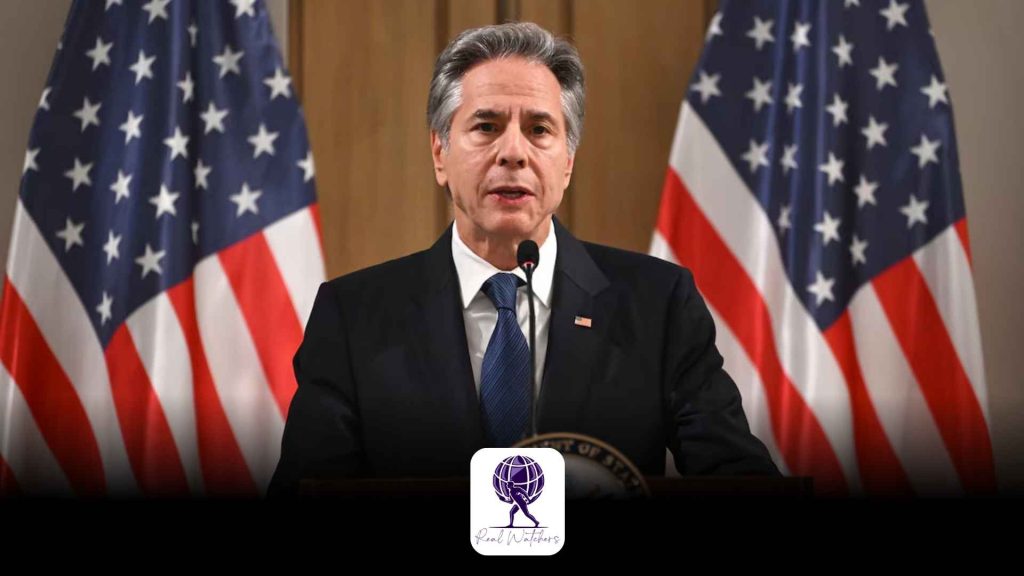Secretary of State Antony Blinken has announced that the United States has established “direct contact” with the HTS rebels currently in control of Syria following the overthrow of the Assad regime.
This marks the initial recognition of direct engagement between the United States and Hayat Tahrir al-Sham, an entity that the US continues to classify as a terrorist organization.
Secretary of State Antony Blinken addressed reporters, confirming that the United States has been actively engaged in discussions regarding the situation of the missing American journalist, Austin Tice.
During his address in Jordan, Blinken engaged in discussions with representatives from multiple Arab nations, Turkey, and European countries, focussing on the future of Syria.
Officials have agreed to back a peaceful transition process in the country. Jordan’s foreign minister emphasized that regional powers are keen to prevent the situation from “descending into chaos.”
A joint communique emphasized the necessity for an inclusive Syrian government that upholds the rights of minorities and refrains from providing a platform for “terrorist groups.”
In the wake of the recent tumultuous events, discussions both within Syria and among the international community have centered on the critical need for establishing a new governance structure that reflects the diverse voices of all Syrians.
The meeting in Jordan proceeded without HTS’s attendance.
Iraqi Foreign Minister Fuad Hussein voiced apprehension regarding the future of Syria, highlighting its implications for the Middle East and beyond.
He stated that regional actors were opposed to witnessing a repeat of the situation in Libya, alluding to the turmoil that followed Colonel Gaddafi’s ousting.
Hakan Fidan, the Turkish Foreign Minister, emphasized the importance of preserving and reforming the existing institutions in Syria.
Terrorism must not be permitted to exploit the transition period. “We must coordinate our efforts and learn from past mistakes,” Fidan stated, as the Reuters news agency reported.
In a continuing escalation, Israel has conducted numerous additional air strikes on Syria, as reported by a war monitoring group, amid widespread regional condemnation.
Israel has stated that it is undertaking measures aimed at dismantling strategic capabilities that pose a threat to its security.
The UN Secretary-General has expressed significant concern regarding the numerous Israeli airstrikes targeting various sites in Syria.
HTS, recognized as Syria’s most formidable rebel faction, was established in 2011 under the name Jabhat al-Nusra, functioning as a direct affiliate of al-Qaeda. The group was widely regarded as one of the most effective and lethal factions in opposition to President Assad.
The group has been designated as a terrorist organization by the United Nations, the United States, Turkey, and several other nations, a classification that continues to be in effect.
The group’s leader, Ahmed al-Sharaa, formerly known as Abu Mohammed al-Jolani, severed connections with al-Qaeda in 2016. He has recently committed to fostering tolerance among various religious groups and communities.
However, the organization’s history of violent jihadism has raised skepticism among some regarding its ability to fulfill these commitments.
The discussions held in Jordan notably needed the presence of a representative from Syria. During the recent meeting, foreign ministers from eight Arab nations expressed their commitment to maintaining Syria’s unity, emphasizing the importance of preventing division along sectarian lines.
The absence of Iran and Russia, the two nations that provided crucial financial backing to Assad, raises questions about the dynamics of power in the region and the implications for his prolonged rule.
The downfall of Assad came after a protracted 13-year civil war ignited by his violent suppression of pro-democracy protests. The conflict has resulted in the deaths of over half a million individuals, forced millions to flee their homes, and drawn in global powers along with their respective proxies.
The influence of external powers that have long contested for control in Syria looms large over the nation’s future.
Syria’s forthcoming leaders face the critical challenge of fostering unity within the nation and on the international stage. This cohesion is essential for the Syrian populace to capitalize on the newfound freedoms they have begun to experience in recent days.








